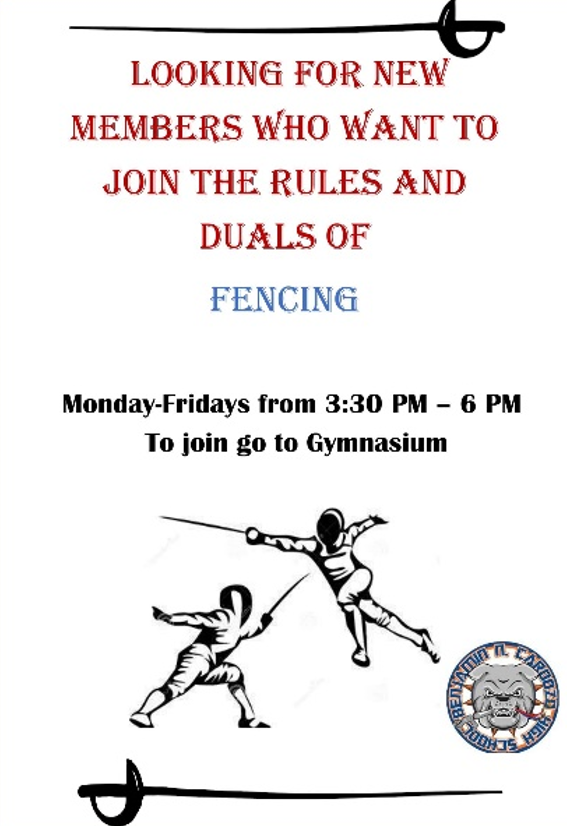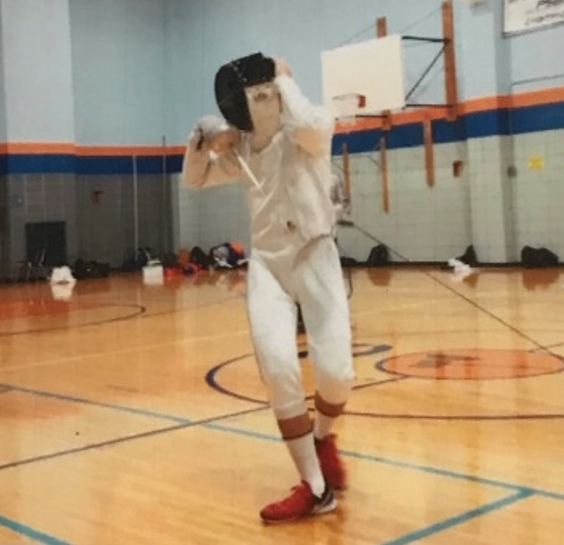
Salute! Dominant foot straight forward and pointing towards your opponent with the back foot perpendicular. Imagine your feet making an “L” as both your feet are heels together. Your weapon in your dominant hand, your mask in the other. Extend your weapon arm and raise it until parallel to the ground. Steadily bring in your elbow and pull the weapon backward and upright. The hilt of the weapon is in front of your lips. Now En-Garde! Your knees are bent and shoulder-width apart. Non-dominant arm positioned behind the body. Don your mask and “Allez!” Advance or retreat, attack or defend. It’s like chess, at 90 miles per hour, with a sword pointing against you. Strategic yet fast-paced. Fencing requires pain and suffering. You will endure it.
Try joining a club or team in high school. In your sophomore year of high school, you are curious and want to join clubs and social activities. You need more friends and social interactions. Coincidentally, you stumble across several fliers throughout the school stating, “Looking for new members who want to join the rules and duals of fencing.” You are not athletic, but you decide to join because you like the idea that no other sport uses sticks to poke each other.
In your first week of practice, you are not quick on your feet. Repeat the same stances: squat, kneel, hold your blade upright. Struggle. You find yourself in many weird positions and stances. Instead of making an “L” with your feet, you make a “V” and advance like you are limping for your dear life. Fall forward like an old man stumbling over stones. Your coach picks you up to just tell you to fix your posture. Retract your shoulders, push your chest out, and repeat the stances, but your legs and knees are too sore to continue. When you are home, in the privacy of your own room, curl up and groan in bed just to ponder your decisions in joining fencing.
Don’t give up. Decide to repeat the stance for countless weeks until one morning you routinely bend your legs and advance. This time it is different. You do not topple; your posture is on point. Lunge against the striking winds like a bird gliding through the air. You have finally done it. You have performed the etiquette of fencing.

Take on your first fencing match. You have learned all the skills necessary for fencing. Sign up for your first “PSAL Junior Varsity Fencing Tournament.” It is going to be a challenge. It starts next Friday. Arrive for your first bout all suited up with your Épée mask and blade. You see everyone, including your teammates and friends and family, sitting on the bleachers applauding for your moment. You have always watched others perform in front of crowds. Now you are the one performing for the crowd. Nerves kick in, and beads of sweat swarm in your palms. You hear the referee call, “Salute, En-Garde, Allez!” It’s showtime.
Panic begins to engulf you as your mind is racing a mile a minute. Should you initiate your attack before or after your moment? Which parry or counterattack should you conduct? Perhaps you are not ready for this match. Perhaps you do not perform well in front of others. Attack, but it poorly misses. Retreat and counterattack, but it misses again. You hear a nasally strong yet melodic voice chant “Ga Yao, Ga Yao.” You have heard that voice before. Distinct. It is the voice of a caring and practical woman: your mom. Your confidence is gradually building. Mutter “Ga Yao.” Push yourself and land those points. Every touch you land brings joy not only to you but to your mom. Ga Yao. Point after point, but your opponent has landed too many from the beginning for you to advance to the next bout. Your mom still stands proud. Smile proudly. You may not have won the match, but you have won your mother’s chant of “Ga Yao” for the rest of your life.
Remember your mom’s romanticized Cantonese chant “Ga Yao.” It literally translates to “adding oil.” It refers not to your ordinary cooking oil or olive oil but rather to petrol. Originating as a cheer at the Macau Grand Prix to imply stepping harder on the gas pedal or giving the car more speed and power to accelerate, Ga Yao to your mom and now to you means to “power up,” not give up, and provides an extra oomph in everyday tasks and struggles. If you ask your mom to sign your test for the teacher’s acknowledgment of parent’s interest and you have failed that test, then she’ll glance at the grade, then back at you with a displeased yet compassionate face. She’ll say: “Next time you will do better. Ga Yao, Ga Yao.” Rejoice in that smile and study harder next time. Similar to your first match, one instance of adversity such as a failing test grade or losing a match isn’t a determinant for your potential to succeed.
Take on the role as an assistant coach for one of the incoming members. In your senior year of high school, you are in your final season of fencing. Decide to be an assistant coach because you are great at teaching others. Your coach assigns you to Liam, a passionate freshman with no prior experience to fencing. Teach him the first fundamental of fencing: Salute and En-Garde. Watch if his knees are bent to shoulder-width apart. Check if his feet are making an “L.” He struggles. Demonstrate how to advance and retreat, which is the second fundamental of fencing. Assist him by leading his dominant foot, followed by his other foot. He tumbles. Perform the last fundamental of fencing: the lunge. He groans.
When he is performing these three fundamentals and trying to fix his posture for weeks, you observe his every move and wonder how on earth he is still making weird stances and falling face front. You’ll soon realize he is in the same shoes you were in three years ago. Tell him how you too have tumbled like an idiot and wanted to give up in the beginning, but persevered and developed into someone greater. Teach him your mom’s chant, “Ga Yao.” Explain how it motivated you not only in fencing but life. Chant “Ga Yao” when he is struggling to fix his posture as his knees and legs are sore. Reinforce it when he is on the brink of giving in to failure. Chant it all the way until his first fencing match. Tell him to mutter “Ga Yao” when he finds it right.
Spar for weeks with Liam. The happiness you have is from watching his confidence seemingly grow through such a simple phrase: Ga Yao. Understand what you must do. Bring his confidence to his first match.
Rally your teammates and friends to chant Ga Yao on his first match. Now you are the observer watching the performer. You hear the referee call “Allez,” and he swoops in without hesitation. His attacks and retreats are faultless, dodging every touch his opponent makes. You all chant Ga Yao. His parries and counterattacks precisely target his opponent. You all chant Ga Yao. His lounges miss by a hair. Mistakes happen. You all chant Ga Yao. Glance at the scoreboard, and his score rises as he lands another point. The clock ticks another few seconds, and he is victorious. Smile at him proudly and blissfully say, “Ga Yao, you did it.”
“No, we did it!” he exclaims.
Act upon the positions when the referee calls “Salute, En-Garde, Allez.” Mutter “Ga Yao.” Clash the two languages like two fencers crossing swords. Thrust. Parry. Thrust. Parry. Remember the relationship isn’t about one winning out; it is about where your strength comes from. Draw strength from both the etiquette of fencing and from your heritage. Go on and utter “Ga Yao” to get through it all.
